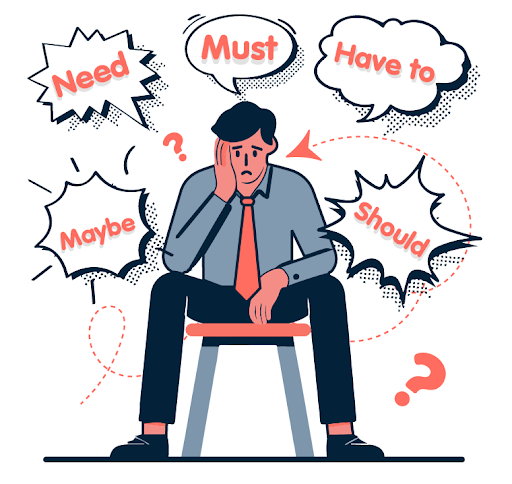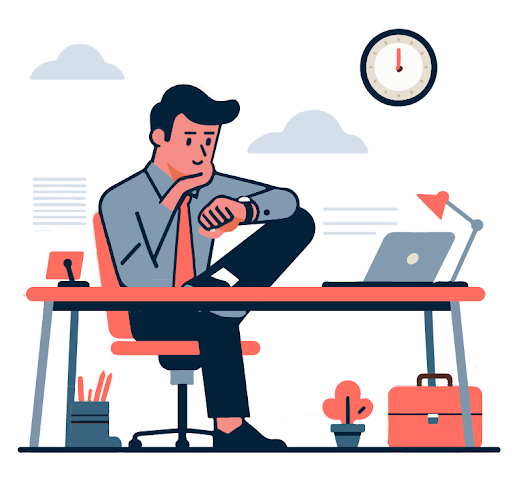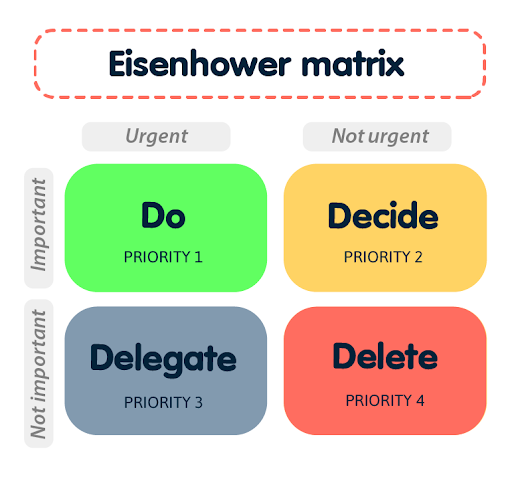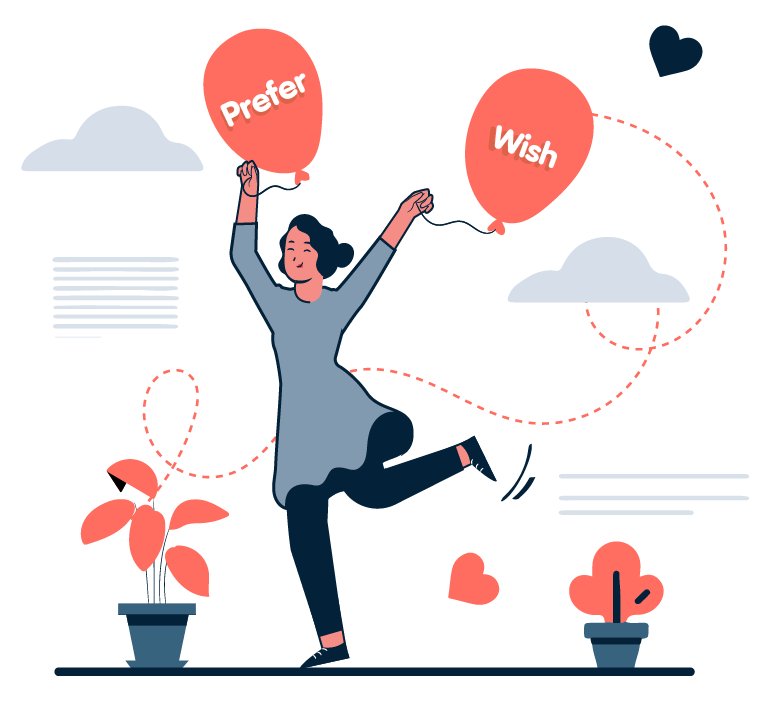I must, have to, need to or maybe I don’t? - cognitive biases
Adrianna Baranowska | 2024-03-20
What is cognitive bias?
I’m sure that you’ve heard about some examples of cognitive bias like the halo effect. However, let’s review what cognitive distortion is. A cognitive bias refers to the systematic pattern of deviation from rationality in judgement or decision-making. It's essentially a shortcut your brain uses to process information more quickly. Most of the time these mental shortcuts are very useful and helpful. Unfortunately, it can sometimes lead to misjudgment, misinterpretation, or bad decision-making. Cognitive biases occur involuntarily and affect perceptions, beliefs, and behaviours. Knowing the existence of cognitive bias does not protect us from being under its influence. Nevertheless, we can counteract against them.
Should statements
The topic of this article is on the border between personal life and work. Why? We use “must”, “should”, “ought to”, or “have to” wherever we are. Among others, these words are indicating “Should” statements. Even though should statements are considered a cognitive bias in some situations it is good to use them. It can help motivate, set expectations, and judge what is acceptable versus unacceptable behaviour.
However… Imagine you couldn’t sleep last night and had an exhausting day at work. You are back home, and you are dreaming about a warm shower and a comfy bed. But you have so much to do! You have to do the washing. You should cook dinner. Your child has to have his homework checked. You must go shopping. Or maybe you don’t? Maybe you have a choice. There will be some consequences if you don’t do it. Are the consequences worse than being exhausted another day? But maybe all those have to, musts, and shoulds are just a shortcut for your brain to not spend energy on decision-making. Maybe you can just take this warm shower and go to bed. The washing can be done tomorrow. Your child won’t mind that you won’t check their homework and even will grow more independent. Can’t somebody else do the shopping or maybe it can wait another day? You have a choice. The impression that you don’t have is the cognitive bias I am writing about in this article.
Expectations
Expressions of what somebody should do generate a lot of unnecessary emotional daily turmoil. When the reality of your behaviour turns out to be inconsistent with your standards and expectations, all the "shoulds" and "musts" become a source of self-loathing, shame, and guilt.

Recently I had a conversation with a colleague. He was stressed about the bugs in his project as he felt he was the culprit. Abstracting that he works in a team and other people also checks features in the code review and testing process. I told him that it is normal that there are bugs, and he responded that there “shouldn’t be so many”. And this is exactly the situation when I as a bystander see the cognitive distortion and its very negative impact. We are now on the path to changing his beliefs or rather getting him out of this negative influence. But we made the hardest part of noticing the distortion.
Then again, the very human and not always-perfect behaviours of others do not match your expectations, which inevitably makes you feel disappointed and resentful. You need to change your expectations so that they are closer to reality, otherwise, you will always be frustrated by other people's behaviour. Moreover, people around you may have different standards, and trying to make them adhere to yours may result in conflicts.
Experiment! What happens if you do nothing?

Recently, my workmate came to me to ask for a piece of advice. There was a miscommunication between his team and the client, who escalated it and wrote an excessive message in the group chat. He felt obligated to respond as he recently became the team lead. After a short discussion, he decided to not write anything and wait. Afterwards, he was glad he hadn’t done anything as others to whom the message had been written responded. The moral of this story is to challenge yourself and try not to do anything or delay some things just to check if it truly is a “must”. Check the positive and negative consequences of your act.
Reevaluating a to-do list
It is important to stop and reevaluate your to-do list. Especially if you haven’t cleared it in a long time or maybe you have and so many things should be done. This will prevent you from falling into the trap of doing something without checking whether you need to do it To help you decide what to keep in or to leave out you can use a tool like the Eisenhower matrix. By ranking tasks by importance and urgency you will prioritise what to do now, what to postpone, what to delegate, and finally what to delete.

Another tool you can use is MoSCoW. It will help you initially divide your tasks into 4 subgropus Musts, shoulds, clouds, and woulds. That way you will reevaluate and know what is most important and won’t shame yourself by not doing clouds and woulds. If you just do must, you still can be proud of yourself! You’ve done as much as you could. If you didn’t manage to the “must” it is not the time to feel guilty. It is time to retrospect and consider what went wrong. Maybe everything was important and everything was in “must”? Maybe you do everything that comes up and leave your to-do list out. Or maybe a higher power prevented you from doing stuff. Psst, both those prioritisation strategies can be used in backlog refinements.
Very (not so) important task - how to deal with it
Have you ever been in a situation where the boss comes to you with something you were aware of but didn’t find vital and all of a sudden it is a “must” and ASAP? Suddenly you have to switch focus and change what you are doing. When you are in the middle of doing it it turns out that it is not so urgent or important anymore. And you are left with a half-done task, ruined plans for the day and you don’t know what to do now. Your old task or this not-so-important new one? Is it possible to break this chain of events earlier? Maybe your boss just had fallen into “must” cognitive bias. Ask your boss why it is so important. What happens if you wait? Or maybe there is a different way you can solve the problem?
Boost your autonomy and motivation
By using words like “prefer” or “wish” instead of should statements you’ll abandon the rigid demands and expectations that lead to distress. Also, it will boost your autonomy and with time can make you more motivated.

In the end, I’d like to emphasise that “should” statements are generally helpful. It can just sometimes grow to be dysfunctional. Therefore I encourage you to do a cost-benefit analysis. Ask yourself what are the advantages and disadvantages of using these statements not in general but in certain situations. How do you react if you break the rules set by it? How do you react if people around you do it? Does this statement motivate you or discourage you? Is using “want”, “prefer, or “wish” instead of “have to”, “ought to” or “must” change your approach and feelings? Experiment!
